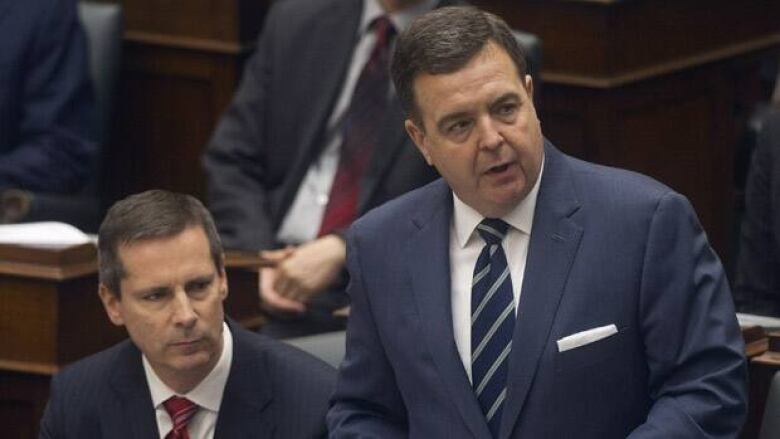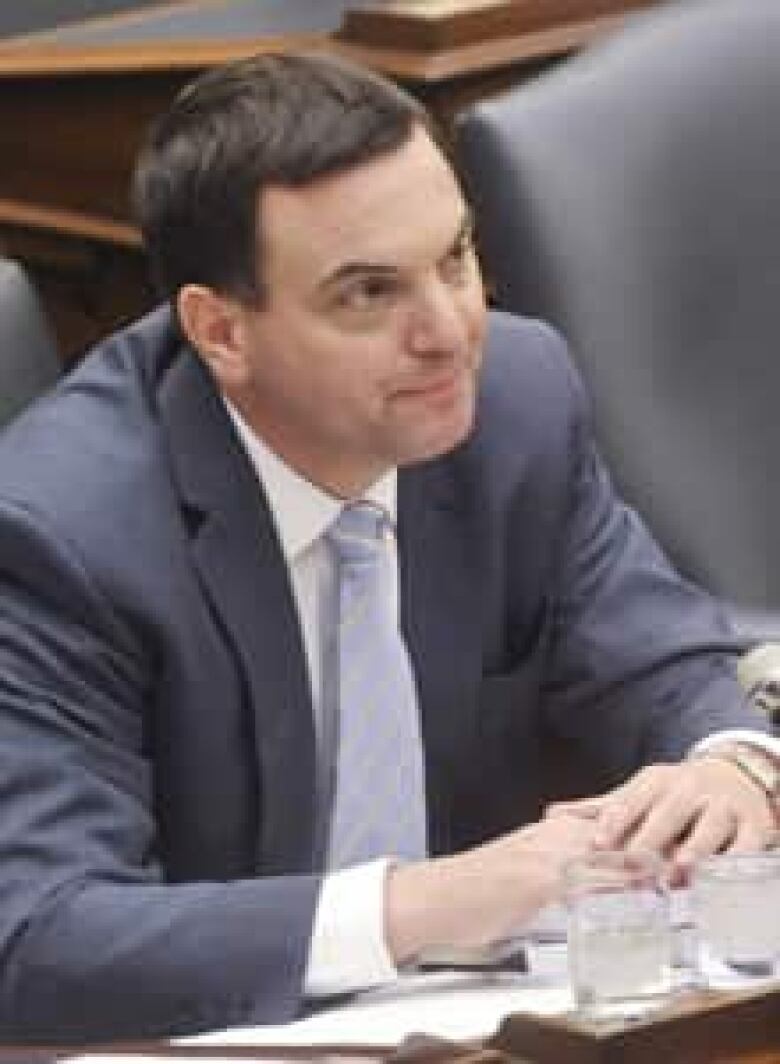Ontario budget targets public sector wages, pensions

The Ontario government plans to balance its books in five years by taking a tough stand in upcoming labour talks with public sector workers and through sweeping changes to government pension plans, according to details unveiled in Tuesdays budget.
HAVE YOUR SAY | Ontario Today opens the phone linesfor your take on the provincial budget from noon to 1 p.m. today on CBC Radio One. Join the conversation by dialing 1-888-817-8995.
The government promised little in the way of new spending and forecast a deficit of $15.3 billion for the coming year, about $1 billion less than was forecast a year ago.
Total program spending is pegged at $115.8 billion, an increase of2.5 per cent over last year as the province struggles to eliminate its deficit by 2017-18, while avoiding major cuts to health care and education.
The stay-the-course budget outlines a handful of belt-tightening measures everything from merging school boards to cutting a subsidy for electricity users but it also moves to cap salaries for government employees, who collectively consume about 55 cents of every dollar the province spends.
The government plans to save $6 billion over three years by freezing the salaries of doctors, teachers and bureaucrats in labour negotiations set to take place this year.
Salary restraint
Finance Minister Dwight Duncan said the government will use legislation to force salary restraint if labour talks fail to hold the line.
"We will deal with our partners at the bargaining table before we take those steps," Duncan told reporters. "But we have to achieve these fiscal numbers."

The province also wants to streamline the arbitration process for labour talks and will move to require both sides to provide written submissions to an arbitrator.
Union leaders called the pay freeze plan a "slap across the face" to public sector workers who are paying the price for a global recession triggered by big business.
"There is no respect in this budget," said Sid Ryan, president of the Ontario Federation of Labour. "This is just an assaultan outright assaultplaying pure politics with public sector workers."
The Liberals also risk alienating the very supporters who've kept them in office for eight years if they end up going back to the polls, he added.
"It's clear what they're trying to do is play on public sentiment," said Fred Hahn, Ontario president of the Canadian Union of Public Employees.
"It's like this budget is about the Liberals giving up hope for the future, instead trading on some kind of mean-spirited sense."
Public sector pensions to be trimmed
Tuesday's budget also outlines, in broad strokes, changes to trim the rising cost of public sector pensions.
The proposed changes will mean government employees who share pension contributions with their employer will be asked to pay a greater share. Public sector pensions where the employer pays the bulk of contributions will be moved toward a 50-50 cost-sharing model.
The province will also consolidate smaller pension funds into larger plans.
The recent government-commissioned Drummond report warned that without reform, the cost of pensions will nearly double by 2017-18.
The proposed pension changes will not affect benefits already earned or cut benefits to workers who have retired.
The province will also move to make high-income seniors pay a larger deductible on prescription drug costs. The changes will affect about five per cent of seniors on the province's drug plan, those with individual annual incomes above $100,000 or couples who earn more than $160,000 a year.
Ontario's debt drag
The province's total debt (borrowing without taking into account assets) sits at $257.5 billion. Last year it was $236.6 billion.
Servicing that debt costs the province about $10 billion a year. Debt servicing is the province's third-largest annual expense and one of its fastest growing expenditures.
The government spends more on servicing the debt each year than it does on colleges and universities.
Each one per cent rise in interest rates boosts the debt servicing cost by about $467 million.
A line from a finance ministry backgrounder puts the problem into perspective: "If no action is taken to balance the budget, Ontario would pay almost as much to service debt in 2017-18 as it spends on education today."
On the revenue side, Ontario will hold the corporate tax rate at 11.5 per cent, putting off a planned rate drop to 11 per cent by July and 10 per cent by 2013.
No support from PCs
With the Liberals in a minority government, their budget bill will need support from opposition MPPs.
Failure to get votes from across the floor will cause the government to fall and trigger an election mere months after Ontarians last went to the polls in October.
PC Leader Tim Hudak said Tuesday there will be no support for the budget from his caucus.
"All my members will be there to vote against it," he said Tuesday. "There's no credible plan to reduce the size and cost of government. This does not address the jobs crisis and does not address the debt crisis."
NDP Leader Andrea Horwath said the budget fails "on key fronts," but would not commit to using her party's votes to defeat it.
"This budget leaves us with a serious decision to make," she said. "I'm going to keep our options open.
"We are going to have a serious conversation with our caucus and families affected by the budget. We're going to take our cues from everyday people."
With files from The Canadian Press












_(720p).jpg)


 OFFICIAL HD MUSIC VIDEO.jpg)
.jpg)



























































































